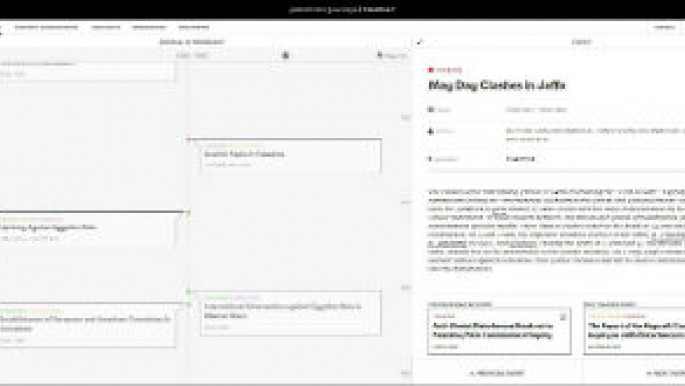
Palestinian Journeys: archiving the struggle and continuing the resistance
One of the many ways Palestinians like to preserve their culture is through taking a personal passion, or talent, be it literature, culinary or art - and pay tributes to their motherland. Ghassan Kanafani, a renowned writer and a leading member of the Marxist Popular Front for the Liberation of Palestine (PFLP), wrote a whole book on the matter, saying in al-Adab al-Moqawameh (the literature of resistance) that resistance supersedes its military nature.
Resistance works also through preservation with a pen, paper and a creative mind.
This applies strongly to the age of technology, where web platforms are being used to archive Palestinian history and culture, and to inform the world of the nationalist struggle which is held tightly by millions of people across the world.
Palestinian Journeys has just been launched by the Palestinian Museum, in collaboration with the Institute for Palestine Studies and Visualizing Palestine.
The platform documents events in Palestinian history from as far back as the Ottoman Empire. Users can search through time periods, or through important themes that have shaped Palestinian history such as the role of women in resistance to practical economics - both for English and Arabic speakers and readers.
 |
|
| The archive's timelines cover events dating back to the 1500s [PalJourneys.org] |
"Palestinian Journeys is a growing repository of multi-faceted expressions of resistance, sumoud ["persistence"], creativity, and hope by Palestinians around the world.
"It strives to capture the active role of Palestinians in documenting their own history, and to foreground narratives that have been suppressed or scattered," the creators said.
Along with Palestinian Journeys being made to be a platform to share Palestinian history, the creators have also sought to bring forward Palestine's vibrant and turbulent history to inspire others.
They have added an "inspire me" section on the website, filled with stories of Palestinians across the space of time, showing the very persistence for which Palestinians are famous. One story in particular talks about the way education was seen as paramount during the first intifada, especially as schools and universities were targeted by Israel. Another shares the history of Palestinian theatre. Yet another talks of the role that making pickles played in building a "resistance economy".
"We are honoured to release Palestinian Journeys to the world, to reach viewers of all ambitions, age groups, and expectations; whether on-the-go mobile users, or hours-on-end researchers; whether Arabic or English speakers," the creators added.
Already, the platform has attracted the attention of high-profile authors and academics around the world.
"Since Palestinian Journeys is such an important milestone for the digital reconfiguration of the Palestinian archive, and since it's so well done, we may start asking it to do absolutely everything we, archive-obsessed people, had ever dreamt of," said Nora Akawi, faculty member at Columbia University GSAPP, director of Studio-X Amman, and executive committee member of Columbia's Center for Palestine Studies.
Check out the archive for yourself, at Palestinian Journeys





 Follow the Middle East's top stories in English at The New Arab on Google News
Follow the Middle East's top stories in English at The New Arab on Google News


